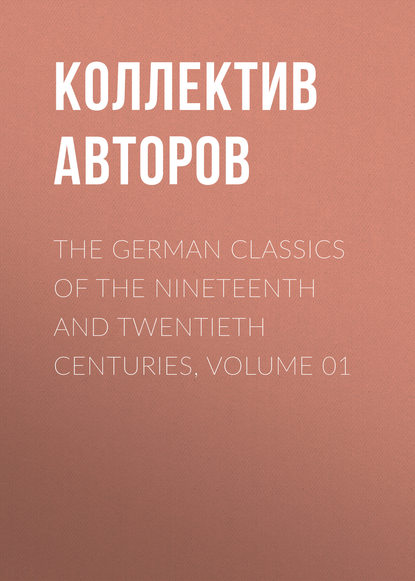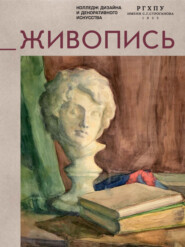По всем вопросам обращайтесь на: info@litportal.ru
(©) 2003-2025.
✖
The German Classics of the Nineteenth and Twentieth Centuries, Volume 01
Настройки чтения
Размер шрифта
Высота строк
Поля
Hermann and Dorothea is universally known and prized in Germany as no other work of the classical period of German literature except Goethe's Faust and Schiller's Wilhelm Tell, and, although distinctively German in subject and spirit, it early became and is still a precious possession of all the modern world. It marks the culmination of the renaissance in the literary art of Germany and perhaps of Europe.
Schiller hailed it as the pinnacle of Goethe's and of all modern art. A. W. Schlegel in 1797 judged it to be a finished work of art in the grand style, and at the same time intelligible, sympathetic, patriotic, popular, a book full of golden teachings of wisdom and virtue. Two generations later one of the leading historians of German literature declared that there is no other poem that comes so near to the father of all poetry (Homer) as this, none in which Greek form and German content are so intimately blended, and that this is perhaps the only poem which without explanation and without embarrassment all the modern centuries could offer to an ancient Greek to enjoy. In the view of the end of the nineteenth century, expressed by a distinguished philosopher-critic, this work is a unique amalgam of the artistic spirit, objectivity, and contemplative clearness of Homer with the soul-life of the present, the heart-beat of the German people, the characteristic traits which mark the German nature.
As Longfellow's Evangeline, treating in the same verse-form of the dactylic hexameter and in a way partly epic and partly idyllic a story of love and domestic interests in a contrasting setting of war and exile, was modeled on Hermann and Dorothea, so the latter poem was suggested by J. H. Voss' idyl Luise, published first in parts in 1783 and 1784 and as a whole revised in 1795. Of his delight in Luise Goethe wrote to Schiller in February, 1798: "This proved to be much to my advantage, for this joy finally became productive in me, it drew me into this form (the epic), begot my Hermann, and who knows what may yet come of it." But Luise is not really epic; it is without action, without unity, without any large historical outlook,—a series of minutely pictured, pleasing idyllic scenes.
In contrast herewith Goethe's purpose was in his own words, "in an epic crucible to free from its dross the purely human existence of a small German town, and at the same time mirror in a small glass the great movements and changes of the world's stage." This purpose he achieved in the writing of Hermann and Dorothea at intervals from September, 1796, through the summer of 1797, in the autumn of which year the poem was published.
The main sources from which the poet drew his material are four. In the first place the theme was invented by him out of an anecdote of the flight of Protestant refugees from the Archbishopric of Salzburg in 1731-1732. On the basis of this anecdote he drew the original outlines of the meeting and union of the lovers. Secondly, as a consequence of the French Revolution, Germans were forced to flee from German territory west of the Rhine. Goethe was present with Prussian troops in France in 1792, and observed the siege of Mainz in 1793. Hence his knowledge of war and exile, with their attendant cruelties and sufferings. Thirdly, the personal experiences of his own life could not but contribute to his description of the then German present. Features of Frankfurt and Ilmenau reappear. The characters show traits of Goethe's parents, and possibly something of his wife is in Dorothea. Hermann's mother bears the name of the poet's and reveals many of her qualities. But some of these are given to the landlord-father, while the elder Goethe's pedantry and petty weaknesses are shown in the apothecary. The poet's experiences in the field are realistically reproduced in many particulars of character and incident, as are doubtless also his mother's vivid reports of events in Frankfurt during July and August, 1796. We may feel sure too that it was the occurrences of this summer that led Goethe to transform the short, pure idyl of his first intention into a longer epic of his own present. The fourth source is literary tradition, which we may trace back through the verse idyl of Voss to the prose idyl of Gessner, thence through the unnatural Arcadian pastorals of the seventeenth and earlier centuries to the great Greek creators,—Theocritus, of the idyl, and Homer, of the epic.
From whatever source derived, the materials were transmuted and combined by Goethe's genius into a broad, full picture of German life, with characters typical of the truly human and of profound ethical importance, interpreting to the attentive reader the significance of life for the individual, the family, the nation.
HERMANN AND DOROTHEA (1797)[31 - Harvard Classics (Copyright P. F. Collier & Son).]
TRANSLATED BY ELLEN FROTHINGHAM
CALLIOPE
FATE AND SYMPATHY
Truly, I never have seen the market and street so deserted!
How as if it were swept looks the town, or had perished! Not fifty
Are there, methinks, of all our inhabitants in it remaining.
What will not curiosity do! here is every one running,
Hurrying to gaze on the sad procession of pitiful exiles.
Fully a league it must be to the causeway they have to pass over,
Yet all are hurrying down in the dusty heat of the noonday.
I, in good sooth, would not stir from my place to witness the sorrows
Borne by good, fugitive people, who now, with their rescued possessions,
Driven, alas! from beyond the Rhine, their beautiful country,
Over to us are coming, and through the prosperous corner
Roam of this our luxuriant valley, and traverse its windings.
"Well hast thou done, good wife, our son in thus kindly dispatching,
Laden with something to eat and to drink, and with store of old linen,
'Mongst the poor folk to distribute; for giving belongs to the wealthy.
How the youth drives, to be sure! What control he has over the horses!
Makes not our carriage a handsome appearance,—the new one? With comfort,
Four could be seated within, with a place on the box for the coachman.
This time, he drove by himself. How lightly it rolled round the corner!"
Thus, as he sat at his ease in the porch of his house on the market,
Unto his wife was speaking mine host of the Golden Lion.
Thereupon answered and said the prudent, intelligent housewife:
"Father, I am not inclined to be giving away my old linen:
Since it serves many a purpose; and cannot be purchased for money,
When we may want it. To-day, however, I gave, and with pleasure,
Many a piece that was better, indeed, in shirts and in bed-clothes;
For I was told of the aged and children who had to go naked.
But wilt thou pardon me, father? thy wardrobe has also been plundered.
And, in especial, the wrapper that has the East-Indian flowers,
Made of the finest of chintz, and lined with delicate flannel,
Gave I away: it was thin and old, and quite out of the fashion."
Thereupon answered and said, with a smile, the excellent landlord:
"Faith! I am sorry to lose it, my good old calico wrapper,
Real East-Indian stuff: I never shall get such another.
Well, I had given up wearing it: nowadays, custom compels us
Always to go in surtout, and never appear but in jacket;
Always to have on our boots; forbidden are night-cap and slippers."
"See!" interrupted the wife; "even now some are yonder returning,
Who have beheld the procession: it must, then, already be over.
Look at the dust on their shoes! and see how their faces are glowing!
Every one carries his kerchief, and with it is wiping the sweat off.
Not for a sight like that would I run so far and so suffer,
Through such a heat; in sooth, enough shall I have in the telling."
Thereupon answered and said, with emphasis, thus, the good father:
"Rarely does weather like this attend such a harvest as this is.
We shall be bringing our grain in dry, as the hay was before it.
Not the least cloud to be seen, so perfectly clear is the heaven;
And, with delicious coolness, the wind blows in from the eastward.
That is the weather to last! over-ripe are the cornfields already;
We shall begin on the morrow to gather our copious harvest."
Constantly, while he thus spoke, the crowds of men and of women
Grew, who their homeward way were over the market-place wending;
And, with the rest, there also returned, his daughters beside him,
Back to his modernized house on the opposite side of the market,
Foremost merchant of all the town, their opulent neighbor,
Rapidly driving his open barouche,—it was builded in Landau.
Lively now grew the streets, for the city was handsomely peopled.
Many a trade was therein carried on, and large manufactures.
Under their doorway thus the affectionate couple were sitting,
Pleasing themselves with many remarks on the wandering people.
Finally broke in, however, the worthy housewife, exclaiming:
"Yonder our pastor, see! is hitherward coming, and with him
Comes our neighbor the doctor, so they shall every thing tell us;
All they have witnessed abroad, and which 'tis a sorrow to look on."
Cordially then the two men drew nigh, and saluted the couple;
Sat themselves down on the benches of wood that were placed in the doorway,
Shaking the dust from their feet, and fanning themselves with
their kerchiefs.
Then was the doctor, as soon as exchanged were the mutual greetings,
First to begin, and said, almost in a tone of vexation:
"Such is mankind, forsooth! and one man is just like another,
Liking to gape and to stare when ill-luck has befallen his neighbor.
Every one hurries to look at the flames, as they soar in destruction;
Schiller hailed it as the pinnacle of Goethe's and of all modern art. A. W. Schlegel in 1797 judged it to be a finished work of art in the grand style, and at the same time intelligible, sympathetic, patriotic, popular, a book full of golden teachings of wisdom and virtue. Two generations later one of the leading historians of German literature declared that there is no other poem that comes so near to the father of all poetry (Homer) as this, none in which Greek form and German content are so intimately blended, and that this is perhaps the only poem which without explanation and without embarrassment all the modern centuries could offer to an ancient Greek to enjoy. In the view of the end of the nineteenth century, expressed by a distinguished philosopher-critic, this work is a unique amalgam of the artistic spirit, objectivity, and contemplative clearness of Homer with the soul-life of the present, the heart-beat of the German people, the characteristic traits which mark the German nature.
As Longfellow's Evangeline, treating in the same verse-form of the dactylic hexameter and in a way partly epic and partly idyllic a story of love and domestic interests in a contrasting setting of war and exile, was modeled on Hermann and Dorothea, so the latter poem was suggested by J. H. Voss' idyl Luise, published first in parts in 1783 and 1784 and as a whole revised in 1795. Of his delight in Luise Goethe wrote to Schiller in February, 1798: "This proved to be much to my advantage, for this joy finally became productive in me, it drew me into this form (the epic), begot my Hermann, and who knows what may yet come of it." But Luise is not really epic; it is without action, without unity, without any large historical outlook,—a series of minutely pictured, pleasing idyllic scenes.
In contrast herewith Goethe's purpose was in his own words, "in an epic crucible to free from its dross the purely human existence of a small German town, and at the same time mirror in a small glass the great movements and changes of the world's stage." This purpose he achieved in the writing of Hermann and Dorothea at intervals from September, 1796, through the summer of 1797, in the autumn of which year the poem was published.
The main sources from which the poet drew his material are four. In the first place the theme was invented by him out of an anecdote of the flight of Protestant refugees from the Archbishopric of Salzburg in 1731-1732. On the basis of this anecdote he drew the original outlines of the meeting and union of the lovers. Secondly, as a consequence of the French Revolution, Germans were forced to flee from German territory west of the Rhine. Goethe was present with Prussian troops in France in 1792, and observed the siege of Mainz in 1793. Hence his knowledge of war and exile, with their attendant cruelties and sufferings. Thirdly, the personal experiences of his own life could not but contribute to his description of the then German present. Features of Frankfurt and Ilmenau reappear. The characters show traits of Goethe's parents, and possibly something of his wife is in Dorothea. Hermann's mother bears the name of the poet's and reveals many of her qualities. But some of these are given to the landlord-father, while the elder Goethe's pedantry and petty weaknesses are shown in the apothecary. The poet's experiences in the field are realistically reproduced in many particulars of character and incident, as are doubtless also his mother's vivid reports of events in Frankfurt during July and August, 1796. We may feel sure too that it was the occurrences of this summer that led Goethe to transform the short, pure idyl of his first intention into a longer epic of his own present. The fourth source is literary tradition, which we may trace back through the verse idyl of Voss to the prose idyl of Gessner, thence through the unnatural Arcadian pastorals of the seventeenth and earlier centuries to the great Greek creators,—Theocritus, of the idyl, and Homer, of the epic.
From whatever source derived, the materials were transmuted and combined by Goethe's genius into a broad, full picture of German life, with characters typical of the truly human and of profound ethical importance, interpreting to the attentive reader the significance of life for the individual, the family, the nation.
HERMANN AND DOROTHEA (1797)[31 - Harvard Classics (Copyright P. F. Collier & Son).]
TRANSLATED BY ELLEN FROTHINGHAM
CALLIOPE
FATE AND SYMPATHY
Truly, I never have seen the market and street so deserted!
How as if it were swept looks the town, or had perished! Not fifty
Are there, methinks, of all our inhabitants in it remaining.
What will not curiosity do! here is every one running,
Hurrying to gaze on the sad procession of pitiful exiles.
Fully a league it must be to the causeway they have to pass over,
Yet all are hurrying down in the dusty heat of the noonday.
I, in good sooth, would not stir from my place to witness the sorrows
Borne by good, fugitive people, who now, with their rescued possessions,
Driven, alas! from beyond the Rhine, their beautiful country,
Over to us are coming, and through the prosperous corner
Roam of this our luxuriant valley, and traverse its windings.
"Well hast thou done, good wife, our son in thus kindly dispatching,
Laden with something to eat and to drink, and with store of old linen,
'Mongst the poor folk to distribute; for giving belongs to the wealthy.
How the youth drives, to be sure! What control he has over the horses!
Makes not our carriage a handsome appearance,—the new one? With comfort,
Four could be seated within, with a place on the box for the coachman.
This time, he drove by himself. How lightly it rolled round the corner!"
Thus, as he sat at his ease in the porch of his house on the market,
Unto his wife was speaking mine host of the Golden Lion.
Thereupon answered and said the prudent, intelligent housewife:
"Father, I am not inclined to be giving away my old linen:
Since it serves many a purpose; and cannot be purchased for money,
When we may want it. To-day, however, I gave, and with pleasure,
Many a piece that was better, indeed, in shirts and in bed-clothes;
For I was told of the aged and children who had to go naked.
But wilt thou pardon me, father? thy wardrobe has also been plundered.
And, in especial, the wrapper that has the East-Indian flowers,
Made of the finest of chintz, and lined with delicate flannel,
Gave I away: it was thin and old, and quite out of the fashion."
Thereupon answered and said, with a smile, the excellent landlord:
"Faith! I am sorry to lose it, my good old calico wrapper,
Real East-Indian stuff: I never shall get such another.
Well, I had given up wearing it: nowadays, custom compels us
Always to go in surtout, and never appear but in jacket;
Always to have on our boots; forbidden are night-cap and slippers."
"See!" interrupted the wife; "even now some are yonder returning,
Who have beheld the procession: it must, then, already be over.
Look at the dust on their shoes! and see how their faces are glowing!
Every one carries his kerchief, and with it is wiping the sweat off.
Not for a sight like that would I run so far and so suffer,
Through such a heat; in sooth, enough shall I have in the telling."
Thereupon answered and said, with emphasis, thus, the good father:
"Rarely does weather like this attend such a harvest as this is.
We shall be bringing our grain in dry, as the hay was before it.
Not the least cloud to be seen, so perfectly clear is the heaven;
And, with delicious coolness, the wind blows in from the eastward.
That is the weather to last! over-ripe are the cornfields already;
We shall begin on the morrow to gather our copious harvest."
Constantly, while he thus spoke, the crowds of men and of women
Grew, who their homeward way were over the market-place wending;
And, with the rest, there also returned, his daughters beside him,
Back to his modernized house on the opposite side of the market,
Foremost merchant of all the town, their opulent neighbor,
Rapidly driving his open barouche,—it was builded in Landau.
Lively now grew the streets, for the city was handsomely peopled.
Many a trade was therein carried on, and large manufactures.
Under their doorway thus the affectionate couple were sitting,
Pleasing themselves with many remarks on the wandering people.
Finally broke in, however, the worthy housewife, exclaiming:
"Yonder our pastor, see! is hitherward coming, and with him
Comes our neighbor the doctor, so they shall every thing tell us;
All they have witnessed abroad, and which 'tis a sorrow to look on."
Cordially then the two men drew nigh, and saluted the couple;
Sat themselves down on the benches of wood that were placed in the doorway,
Shaking the dust from their feet, and fanning themselves with
their kerchiefs.
Then was the doctor, as soon as exchanged were the mutual greetings,
First to begin, and said, almost in a tone of vexation:
"Such is mankind, forsooth! and one man is just like another,
Liking to gape and to stare when ill-luck has befallen his neighbor.
Every one hurries to look at the flames, as they soar in destruction;
Другие электронные книги автора Коллектив авторов
Живопись




 0
0

















